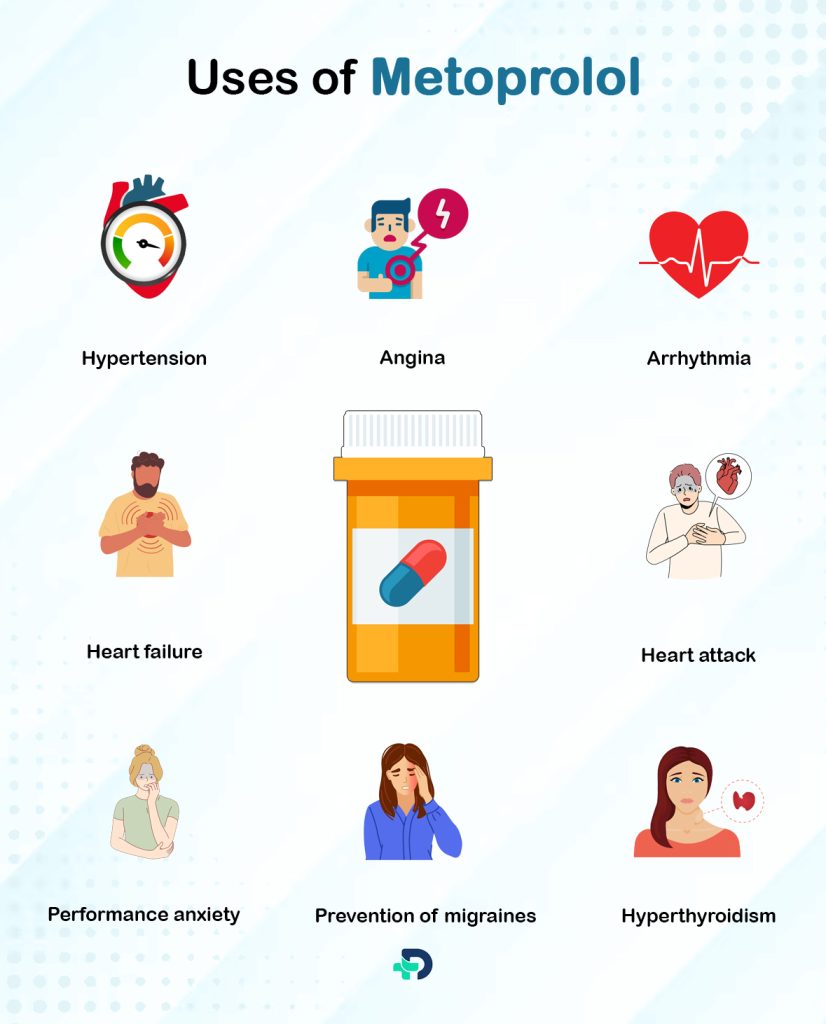Metoprolol: Uses, Side Effects, and Precautions

- Metoprolol
- 07 Sep 2023
Introduction
What is Metoprolol?
Metoprolol is a medicine frequently used to treat heart-related problems, including high blood pressure, angina (chest discomfort), and specific arrhythmias. It is a member of the beta blocker drug class, which prevents the heart and blood vessels from being affected by adrenaline. In this article, we delve into the complexities of metoprolol, looking at its mode of action, many applications, potential advantages, and crucial factors for patients and healthcare professionals. We aim to give readers a more precise knowledge of this medication’s function in the intricate realm of cardiovascular therapy by illuminating its numerous aspects.

Uses

Uses of Metoprolol
- Hypertension (high blood pressure)
- Angina (chest pain)
- Arrhythmia (irregular heartbeat)
- Heart failure
- Myocardial infarction (heart attack)
- Migraine prevention
- Performance anxiety and tremors
- Hyperthyroidism
It is used to manage and treat several cardiovascular diseases. Among its main applications are:
Hypertension
- In order to lower high blood pressure, which lessens the strain on the heart and blood vessels and lowers the risk of complications, it is routinely administered.
Angina
- Angina, a condition that the medication helps treat, is brought on by decreased blood flow to the heart muscle.
- It relieves symptoms by lowering blood pressure and heart rate, which decreases the heart’s need for oxygen.
Arrhythmia
- Utilizing the heart rate and rhythm, it is successful in controlling some types of arrhythmias. For supraventricular arrhythmias, it is beneficial.
Heart failure
- It may be administered in some cases of heart failure to increase exercise tolerance, improve heart function, and lower the risk of hospitalization.
Heart attack, or myocardial infarction
- It is occasionally used to stop further cardiac episodes after a heart attack.
- It can increase survival chances and lower the risk of having another heart attack.
Prevention of migraines
- It may lessen the frequency and intensity of attacks, relieving certain people who frequently suffer from migraines.
Tremors and performance anxiety
- Stage fright and some types of tremors are examples of performance anxiety that can be controlled with its effects on heart rate.
Hyperthyroidism
- It can treat hypothyroidism symptoms brought on by an overactive thyroid gland. 1Uses | Researched based study from National Institutes of Health 2Uses | Researched based study from Food and Drug Administration
Side Effects
Side Effects of Metoprolol
- Fatigue or tiredness
- Dizziness or lightheadedness
- Cold extremities
- Slow heart rate
- Gastrointestinal symptoms
- Difficulty sleeping
- Depression or mood changes
- Shortness of breath
- Masking of hypoglycemic symptoms
- Uncommon side effects
It may result in side effects, just like other medications. Here are a few of the typical phrases once connected to it:
Weakness
- Some individuals may feel worn out, especially when first starting the medicine. This is a result of how it affects blood pressure and heart rate.
Lightheadedness
- It may reduce blood pressure, making you feel lightheaded, especially when getting up rapidly.
Cold extremities
- Some persons may experience a chill in their hands and feet as a result of the blood circulation-altering effects of the medicine.
Slow heartbeat
- It may decrease heart rate and, in rare situations, it may do so indirectly, resulting in bradycardia.
Gastrointestinal symptoms
- Potential adverse effects include nausea, stomach distress, and discomfort with digestion.
Difficulty sleeping
- One possible side effect for some people who take it is having trouble sleeping or staying asleep.
Mood swings or depression
- Beta-blockers, such as a matter of roll-on, have occasionally been associated with mood changes, including signs of sadness.
Breathing difficulty
- Rarely can it help those with preexisting lung conditions with breathing issues.
Hypoglycemic symptoms are covered up.
- It’s crucial to regularly monitor blood glucose levels in people with diabetes since it can conceal the typical symptoms of low blood sugar.
Rare side effects
- Impotence, a decreased capacity for physical activity, and eyesight abnormalities may all be included. 2Side Effects | Researched based study from Food and Drug Administration
Dosage
Dosage and Storage
- It may change according to the disease being treated and how the patient reacts to the medicine. It’s crucial to adhere to your doctor’s recommendations and the dosage details listed on the prescription label.
- The dosage typically begins at a lower level to achieve the intended effect and increases gradually.
- It should be kept at room temperature and out of direct sunlight and moisture.
- When stored, it must be kept out of children’s and pets’ reach. 2Dosage | Researched based study from Food and Drug Administration
Precautions
Contraindications and Precautions
Consultation with the Healthcare provider
- Always take it as directed by a healthcare expert who can evaluate your medical history, present health issues, and any other medications you might be taking.
Allergies
- Let your doctor know if you experience any reactions, especially to beta blockers. Milder skin reactions to more severe symptoms can all be caused by allergies.
Current medical conditions
- Inform your doctor if you have ever had diabetes, heart issues, liver illness, chronic obstructive pulmonary disease (COPD), asthma, kidney disease, or other conditions.
Breastfeeding and becoming pregnant
- Inform your doctor if you are nursing a baby, planning a pregnancy, or are already pregnant. It can be excreted in breast milk in very small amounts. Whether it is safe to use during pregnancy and nursing is still being researched, so your doctor will balance the advantages against the risks involved.
Heart failure
- Your doctor will closely track your reaction to heart failure if you have it. It may be prescribed in some circumstances to improve heart function, but constant supervision is necessary.
Abrupt discontinuation
- Avoid stopping suddenly without first consulting your doctor. Beta-blockers should not be abruptly stopped since this may result in increased heart rate, raised blood pressure, and other negative consequences.
Surgery
- Inform your doctor that you are taking this medication if you are getting surgery soon. They could advise temporarily halting it before the treatment.
Driving and operating machinery
- It can make you feel lightheaded, impairing your ability to drive or use machinery. Till you are aware of how it affects you, proceed with caution.
Follow your doctor’s instructions when it comes to routinely monitoring your blood pressure and heart rate. This ensures that it functions appropriately and enables any necessary adjustments to be made promptly. 2Precautions | Researched based study from Food and Drug Administration
Interactions
Drugs that may interact with Metoprolol
Additional beta-blockers
- Combining various beta blockers can intensify their effects and increase the risk of excessive heart rate slowing or blood pressure lowering.
Blockers of calcium channels
- When used with metoprolol, they may have more robust benefits because they can also lower blood pressure and heart rate.
Antiarrhythmic medications
- Metoprolol and several antiarrhythmic medications may have detrimental effects on heart rhythm.
NSAIDs
- Non-steroidal anti-inflammatory medicines (NSAIDs) may lessen this medication’s antihypertensive effects.
MAO inhibitors
- When used with metoprolol, monoamine oxidase inhibitors might cause severe rises in blood pressure.
Diabetes therapy
- It may cause some low blood sugar symptoms, making managing diabetes more difficult. 2Interactions | Researched based study from Food and Drug Administration
Conclusion
The Bottom Line
It is a typical beta blocker medication that is used to treat ailments including high blood pressure. It is essential to take pharmaceutical interactions seriously. Always adhere to your doctor’s dosage recommendations and prescription directions. It is imperative to report any unexpected or serious symptoms right away. By being proactive and knowledgeable about these, you can work with your healthcare practitioner to maximize the advantages of metoprolol while lowering potential risks.
Any feedback on this article?
 This Articles content was accurate
This Articles content was accurate Very Informative Article
Very Informative Article I have a question or a comment
I have a question or a comment
 This article contains inaccurate content
This article contains inaccurate content This article was not helpful
This article was not helpful I have a question or a comment
I have a question or a comment
We appreciate your helpful feedback!
Checkout our social pages
References
-
National Institutes of Health
Uses
-
Food and Drug Administration
Uses | Side effects | Dosage | Precautions | Interactions




































